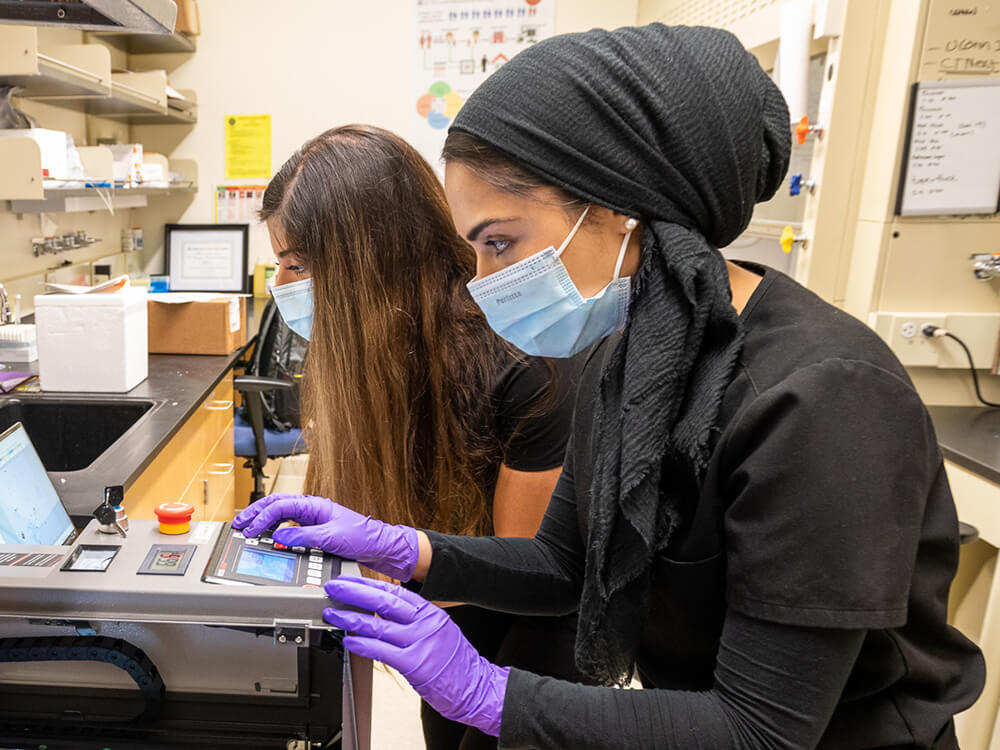University of Connecticut School of Pharmacy students gain practical knowledge in an immersive biotech work program.
By Emily Jacobs
Laboratory work and clinical rotations provide crucial hands-on learning for student pharmacists. However, they may not offer an immersive experience that challenges students to apply their knowledge in creative ways. Real-world experience can elude many student pharmacists until well into their pursuit of an advanced degree.
Enter the Technology Incubation Program (TIP) at the University of Connecticut School of Pharmacy. Launched in 2012, this immersive, 10-week summer program matches students with host startup companies located in UConn’s technology incubators in Storrs, Farmington and Stamford. This program encourages the startups’ development and research while giving students practical experience in a setting that combines business and technology. It is open to students of any major at UConn and has included pharmacy and Pharm.D. students since 2016.
“It has been a wonderful collaboration,” said Dr. Caroline Dealy, UConn Health faculty member and TIP Innovation Fellows program founder and director. “[School of Pharmacy] Dean [Philip] Hritcko has been just so supportive of the program.”
Both the startups and the students must apply to participate in the program. To join TIP, startups must assign a mentor from their team for the participating student. They also must describe their qualifications and plans for the program to UConn, ensuring that the student will be engaged and productive.
Approved startups review students’ applications and choose individuals to work with for the summer. UConn deans provide funding for the students’ fellowships. Students in TIP also have the opportunity to continue their project after the end of the 10 weeks for research credit.
Insight into Startups
Depending on the startup and their projects, TIP students can experience both the business and science aspects of the startup. TIP participants may have opportunities to accompany their mentors to pitches for venture funding. Other students, whether their major is science- or business-related, may be invited to sit in on meetings and observe day-to-day operations.
“This is not really an internship,” Dealy noted. “The companies that host students are aware that this really is a labor of love on their part, to mentor the students and [introduce them to] the whole environment of a startup, which is so different than an academic laboratory or a desk in the accounting department of a big company. It's a very different experience than a traditional internship.”
Besides accessing hands-on learning opportunities within a startup, TIP participants also attend weekly seminars. These often feature speakers on innovation and entrepreneurship, providing insights that STEM students may not otherwise hear. TIP also includes career development topics, such as setting up a LinkedIn page and preparing a CV. Before COVID-19, the program included a symposium at the end of the summer, which program leaders hope to revive in 2022.
Three UConn School of Pharmacy students participated in TIP this past summer. Two of them, 2023 Pharm.D. candidates Saba Azam and Roxanna Monshi, worked in the laboratory of the startup Encapsulate. Based in Farmington, Encapsulate produces tumor-on-a-chip systems that can grow cancer cells outside the patient’s body. Researchers use these cells to test the efficacy of chemotherapeutic drugs, which could help determine the best course of treatment for cancer patients.
Under the mentorship of Encapsulate CEO Armin Tahmasbi Rad, Azam and Monshi were able to apply their pharmaceutical knowledge to help develop the startup’s technology. “We actually used some resources that were provided to us by the school, such as drug databases, and we looked at what the current dosing standards are and stuff like that, to kind of work with his [tumor-on-a-chip] device,” explained Azam.

